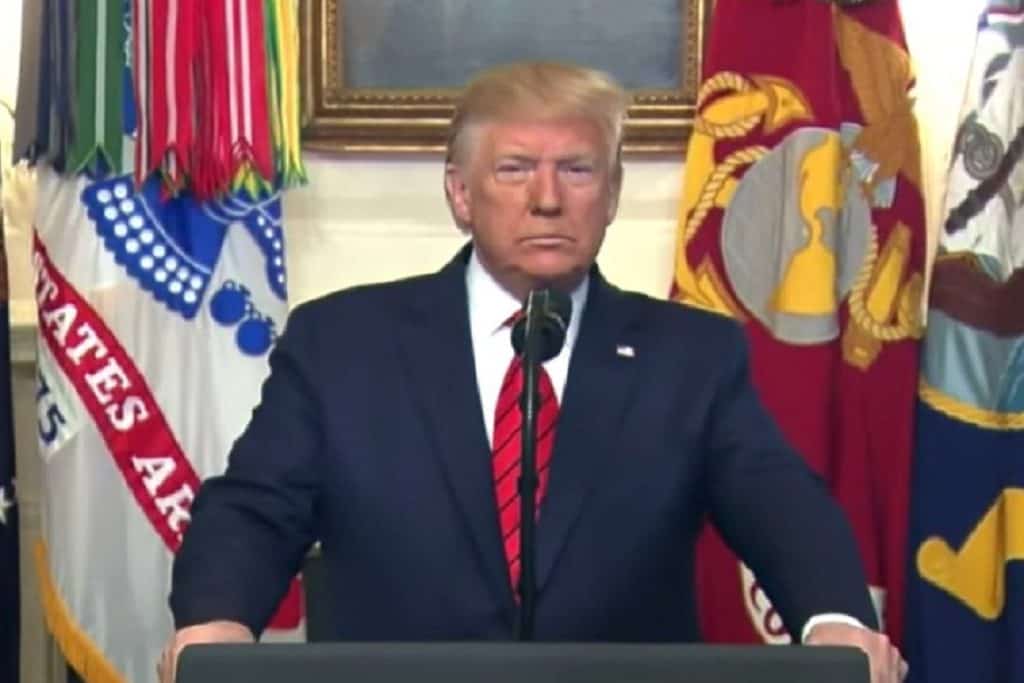By Denis Korkodinov
The foreign policy of US President Donald Trump has recently acquired a clearly unsystematic nature. The withdrawal of US troops from northeastern Syria, and the conflicting information about the killing of the leader of the Islamic State, were some of the manifestations of the onset of this crisis, which may confirm the inconsistency of the foreign policy of the White House administration.
It is worth noting that the foreign policy initiatives of Donald Trump, as a rule, do not differ in constancy. For example, the refusal to support the leader of the Venezuelan opposition, Juan Guaido, who initially had high hopes for the coup attempt in Caracas, then the withdrawal of American troops from Syria, from where the United States did not intend to leave for a very long time. Finally the information about the operation, that could not stand up to criticism, to eliminate Abu Bakr al-Baghdadi, may lead to the conclusion that Donald Trump often does not understand what he is doing.
Such sharp fluctuations in the policies of the head of the White House strengthen the position of his rivals during the presidential campaign, since the 45th president of the United States risks getting into history as a politician who has completely lost the trust of his allies. However, the presidential administration was already beginning to understand this, which allowed White House spokeswoman Stephanie Grisham to declare in an interview with Fox News that the US was “ready for impeachment to happen.”
It would seem that nothing happened because the Syrian Kurds considered the withdrawal of American troops an act of betrayal. Nevertheless, the Kurdish diaspora in the United States, albeit insignificant, represents an electorate whose vote will be taken into account during the election of the head of the White House in 2020. And if the voices of American Latinos, disappointed with the policies of Donald Trump in Venezuela, are added to the voices of the American Kurds, then the figure is significant. Thus, the head of the White House in his presidential campaign is unlikely to be able to count on these votes, which will get his opponents.
In turn, information about the liquidation of the leader of ISIS, Abu Bakr al-Baghdadi, creates only a short-term effect of the triumph of the American administration. The problem is that the killing of “terrorist number one” by Washington’s hands may cause a sharp surge in terrorist activity. At the same time, the main target of jihadists, with a high degree of probability, will be the territory of the United States. At least ISIS almost immediately after confirming the information about the death of Abu Bakr announced a series of major anti-American attacks. Analysts predict that if these threats are real, then the US is likely to expect terrorist attacks, in comparison with which the collapse of the “twin towers” may seem like childish fun.
In this case, the triumph of Donald Trump, caused by the assassination of Abu Bakr al-Baghdadi, can cause criticism of both right and left political forces, since the 45th president of the United States is unlikely to be able to prevent a series of unprecedented terrorist attacks. This could represent the end of Donald Trump’s career.
In addition, amid growing anti-Russian and anti-Syrian sentiment in the United States, Trump made an excellent gift to Moscow and Damascus through the withdrawal of American troops. Vladimir Putin and Bashar al-Assad, not counting Recep Erdogan, received almost complete carte blanche in the north-east of the SAR. In this regard, Washington’s recent slogan that “Bashar al-Assad must leave” has lost all meaning, since the Syrian president will not go nowhere. At the same time, Moscow clearly benefited from the existing combination of forces in the Syrian theater of operations.
Thus, Donald Trump has lost confidence in those American voters who hate Vladimir Putin and Bashar Assad for years, because, according to these voters, Trump actually admitted US defeat to Moscow and Damascus.
Meanwhile, the liquidation of the leader of ISIS served as the main motivator for the jihadists, who most likely began to harbor plans for revenge. This has significantly increased the risk of regional instability.
The international community, in turn, also expressed concern, since the death of Abu Bakr raises many questions about whether Donald Trump will be able to neutralize a new wave of terrorist activity that threatens almost all countries in the world. For this reason, the leaders of the states, despite the loud statements about the success of the US military operation, are watching with concern what will happen next.
(The opinions expressed in this article are solely those of the author and do not necessarily reflect the views of World Geostrategic Insights)







